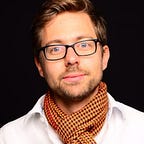What I’ve read last year
An annotated and incomplete list
I’ve made an effort in 2013 to read more books again, especially more novels. And because I realized that I tend to forget most about the books I’ve read shortly after I’ve read them, I decided to create this list. Here are my reads from last year, at least the ones I remember well enough to write at least one sentence about them, in no particular order.
Understanding Comics: The Invisible Art, by Scott McCloud
I’ve re-read this book after several years, and it’s still the best thing I’ve ever read about comics. McCloud treats comics as a medium of its own, and explores its characteristics and techniques — naturally in the form of a comic.
Tinker, Tailor, Soldier, Spy, by John le Carré
The star of all spy novels: Brilliantly constructed, slow-moving. A pleasure to read.
The Brief and Wondrous Life of Oscar Wao, by Junot Díaz
The sad and funny story of Oscar, an overweight and unhappy nerd and Dominican immigrant in the U.S., whose bad luck is attributed by the narrator of the book, Junior, to an ancient curse. Worthwhile reading simply because it’s written in a mix of English and Dominican Spanish, and for the footnotes that offer profanity-riddled commentary on recent history of the Dominican Republic.
Getting to Yes: Negotiating Agreement Without Giving In, by Roger Fisher
Succinct and helpful advice on negotiating. Contrary to other advice books, it’s short and to the point. Basic mantra: “Negotiate on interests, not positions”. I probably should have read that a lot earlier.
The Alchemists: Three Central Bankers and a World on Fire, by Neil Irwin
An account of the financial crisis and its aftermath from the perspective of the heads of the Fed, the ECB, and the Bank of England. Irwin writes entertainingly and understandable, even for someone with very limited knowledge of central bank economics like me. Found it enlightening to learn about the role of central banks over the last years. Skip the first chapter about the history of central banks, which is too shallow.
Midaq Alley, by Naguib Mahfouz
Published more than 65 years ago, this is still a fantastic book. Mahfouz’ loving description of a run-down alley in Cairo and its inhabitants is gripping, even though not much happens through the entire book.
Trading With The Enemy: A Yankee Travels Through Castro’s Cuba, by Tom Miller
Miller is an American journalist who traveled through Cuba in the early nineties, during the so-called special economic period (when Cuba was in a deep crisis due to the collapse of the Soviet Union). I read the book while in Cuba, and found comparing Miller’s descriptions to the Cuba of today interesting. The lack of any sort of overarching narrative can make it tiring to read sometimes.
Telex from Cuba, by Rachel Kushner
Kushner’s first novel is set in the American community in Cuba, in the years leading up to the revolution. Written from the perspective of two American children, it beautifully describes the luxurious lives of the Americans in Cuba, and its slow disintegration when the revolution gets under way. The second plot, involving an American cabaret dancer and a French weapons dealer, is much less convincing.
Moonwalking With Einstein: The Art and Science of Remembering Everything, by Joshua Foer
Part reportage, part self-help book, Foer describes how he decides to compete for the American Championship in Memorization (or so). While the descriptions of his experiences are funny and entertaining, I didn’t find the book completely convincing. And I still can’t remember everything.
Die Vermessung der Welt, by Daniel Kehlmann
A fictional account of the lives of Alexander von Humboldt and Carl Friedrich Gauss, and the times they lived in. Kehlmann portrays the two famous scientists as humans rather than geniuses, which is often hilarious. (Read it in German)
How To Get Filthy Rich in Rising Asia, by Mohsin Hamid
Mocking the style of self-help books, Hamid describes the meteoric rise to wealth and power (and subsequent fall) of a boy born in poverty in an unnamed Asian city. Fantastic book.
The Reluctant Fundamentalist, by Mohsin Hamid
Hamid’s first book is the monologue of a Pakistani man talking to an American tourist in Lahore. The narrator tells of his studies and work in the U.S., and how his identity as a successful immigrant suddenly begins to change after 9/11. It’s a short and chilling read.
The Harry Hole Series, by Jo Nesbø
I’ve read all of the ten books of this crime series featuring Norwegian investigator (and constantly relapsing alcoholic) Harry Hole. The first five or six make for light but packing reading; after that, the series becomes a bit repetitive, and too obviously written for movie adaptation.
The Erlendur Series, by Arnaldur Indriðason
A series of crime novels set in Iceland. Very slow, but well constructed. Read two of them so far.
